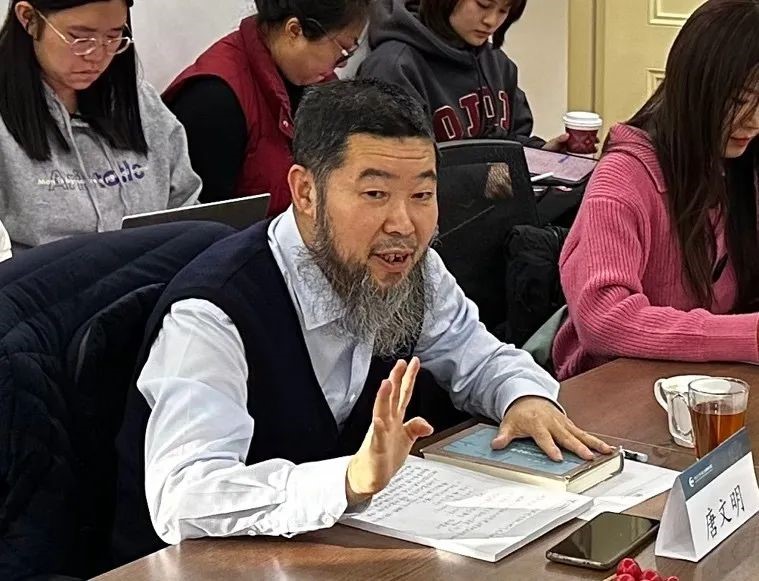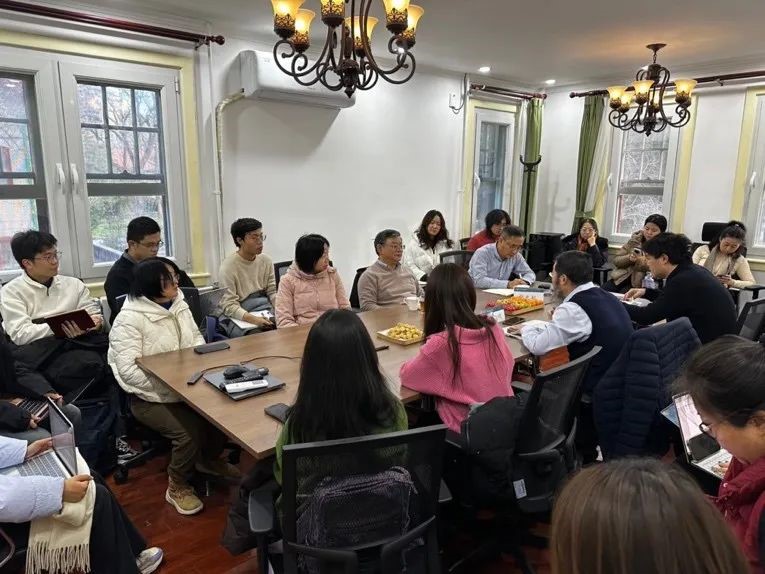
On November 26, 2024, the 11th lecture in the Master Salon series hosted by the Institute of Area Studies, Peking University (PKUIAS), took place at No. 66, Yannanyuan. The title of the lecture was “Voegelin’s Deconstruction of the Axial Age Narrative.” The speaker was Tang Wenming, professor of philosophy at the School of Humanities, Tsinghua University. The commentator was Tang Shiqi, PKUIAS director and the dean of the School of International Studies, Peking University.
In the salon, Prof. Tang Wenming focused on his new book The Leap in Being and the Art of Balance. Through an analysis of Voegelin’s various texts, he discussed how Eric Voegelin entered into dialogue with philosophers of history such as Karl Jaspers, how he came up with the Ecumenic Age narrative, and how he analyzed Chinese civilization on the basis of his philosophy of order, leading to Voegelin’s understanding and exposition of the principle of order in Chinese civilization.
Tang Wenming first introduced four types of scholars in the domestic academic circles who study Voegelin. The Straussian school, represented by Prof. Liu Xiaofeng, mainly focuses on Voegelin’s critique of modern Western political philosophy and values his eight-volume History of Political Ideas. Another group, represented by Prof. Li Qiang, consists researchers in political theory and the history of political thought who attach great importance to Voegelin’s unique analysis of Western political thought. Some scholars, either from their Christian faith or through their academic interests, value Voegelin from a Christian perspective, while others, particularly Confucian scholars, are drawn to Voegelin’s proposal of the Ecumenic Age narrative and his special discussion of the Ecumenic Age in China. The late Mr. Zhang Hao was also influenced by Voegelin in his research on the history of ancient and modern Chinese thought, especially in formulating his concept of “dark consciousness” and the idea that all modern thinking is utopianism, where Voegelin’s influence is clearly evident.
Tang Wenming pointed out that because Voegelin was a very original thinker with a broad research vision, different scholars have focused on Voegelin’s research out of their own backgrounds. For example, Jewish scholars have paid special attention to Voegelin’s book Israel and Revelation. In contrast, Voegelin’s book Ecumenic Age has not received enough attention in the past. Tang Wenming said he believed that Voegelin’s study of Chinese civilization could provide a good dialogue with Jaspers’ view of the Axial Age. In his book The Origin and Goal of History, Jaspers put forward the term Axial Age, meaning that between 800 B.C. and 200 B.C., all the major advanced civilizations of the world developed simultaneously. This development was marked by spiritual or transcendental breakthroughs. Voegelin, however, pointed out that the Axial Age claim inappropriately excludes Moses and Jesus from the Axial Age of Western civilization. If we look at the Axial Age theory’s interpretation of Chinese civilization from the same reflexive perspective, we will find the same problems. For example, the assertion that the age of Laozi and Confucius represents the Axial Age of Chinese civilization ignores the constructive significance of earlier periods, such as the age of Huangdi (the Yellow Emperor), emperors, and kings. Furthermore, the link between Confucius and these earlier rulers may have been severed.
Tang Wenming pointed out that Voegelin’s view of the Axial Age as a modern fictionalization forces human beings into a single historical narrative. This approach, he argued, remains bound by a unilinear view of history. In contrast, Voegelin presented his Ecumenic Age narrative. Voegelin elaborated the significance of a “leap in being”, empire building, and historiography in the process of human history, and thus regarded the triad of these three as the “mode of intelligibility that makes meaning present in the field of history,” or the so-called “configuration of history”.
Tang Wenming then went on to explain and share his views around the issues of Gnosticism, which was of particular interest to Voegelin; the philosophy of history arising from the existence of multiple ecumenes; and the idea of China as a paradigm of an artful civilization.

After Tang Wenming’s presentation, Prof. Tang Shiqi commented that, compared to the Western Christian tradition, Chinese civilization is indeed more human-centered in general, and that Confucianism is less expressive of—or even reluctant to express—transcendence. This is because Confucian philosophy contains fewer concepts related to transcendence, such as “absolute being” and “Unmoved Mover”. Instead, it focuses more on individuality, variability and possibility, as well as on practice rather than systematic theory. This emphasis may have led to a relatively low degree of institutionalization in Chinese politics and a tendency toward a cult of power and the individual. Voegelin argued that China’s move toward authoritarianism after the Qin and Han dynasties was due to a lack of critical spirit in Chinese thought, which may have had something to do with Confucianism’s preference for the Golden Mean. However, the Western rationalist tradition, which is built on transcendence, also brought some problems of modernity due to its over-pursuit of the unchanging and essential. As a result, the German Romantics, Nietzsche and Heidegger, reflected on and criticized rationalism in modern times. In this sense, Chinese and Western civilizations can still learn from each other and complement each other.
In the exchange session, the participating teachers and students engaged in a dialogue and discussion with Prof. Tang Wenming on the topics of the American filter in European philosophy, the philosophy of history, ecumene and empire.


